“The best predictor of future behavior is past behavior.” It’s a quote attributed to nobody in particular, and a favorite of Elliotte Friedman, who is known to use it on his podcast 31 Thoughts. It’s also something Calgary Flames fans should bear in mind when trade rumors surface.
In the wake of the Michael Frolik trade, in which the Flames received a fourth-round pick in exchange for their depth winger, the rumors surrounding Calgary’s activity (or at least, potential activity) in the trade market have only grown stronger. It’s enough to cause flashbacks to the 2019 NHL trade deadline, the last time rumblings were this loud. By the admission of Flames general manager Brad Treliving, trading Frolik with no salary retained was a move to free up cap space, which he intends to use.
It’s staggering to think about, but according to credible reports, Treliving has come close to completing four other major trades in the past 10 months, but has been unable to close. In chronological order, the team almost acquired Mark Stone, Jason Zucker, Nazem Kadri and Taylor Hall. In the summer, Treliving closed a substantial deal with the Edmonton Oilers, acquiring Milan Lucic and a conditional pick for James Neal. Although the roster looks mostly the same as last season, the GM has been a busy bee.
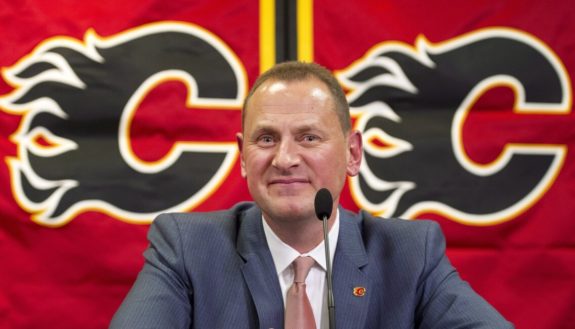
Nobody’s inside Treliving’s head, but if you look at all the trade reports from the past 12 months from a distance, they offer a blueprint of how he handles trades.
His past behavior is the best predictor of how the Flames will approach the 2020 NHL trade deadline. So let’s recap four things we’ve learned in the months since Feb. 2019.
Who on the Flames Is Available
It’s no secret that the Flames have a surplus of depth forwards, which is an enviable problem because they act as a buffer against injuries. You never know when you might need someone like Austin Czarnik or Zac Rinaldo to step up and become a regular.
With Czarnik and Sam Bennett coming back from injury around the same time, the Flames have needed to scratch at least two or three of their depth forwards on any given night. Czarnik has been playing exclusively in the AHL since the doctors cleared him for game action.
From Elliotte Friedman’s 31 Thoughts Blog:
“Calgary’s got extra bodies, and some of the players shuffling in-and-out of the lineup are unhappy.”
With roster decisions come rumors. Is player X a healthy scratch because he’s being traded? Is player Y getting more ice time to increase his trade value?
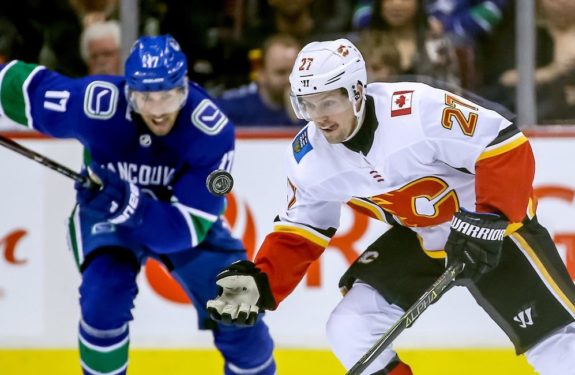
If we stick to reports from credible sources, here is what we know:
- According to reports, the Flames were discussing a trade last year with the Minnesota Wild that would have seen Zucker (and maybe some other pieces) come to Calgary in exchange for a package that included Michael Frolik and Sam Bennett, (from ‘Penguins, Wild in trade talks revolving around Phil Kessel,’ The Athletic, 05/23/2019). The assumption was that Zucker would slide in nicely on the second line right wing, which was the only uncertain position in the Flames’ top six at the time. Without Frolik, that leaves Bennett, Calgary’s highest-ever draft pick, as potential trade bait. Friedman noted that other teams have been interested in him.
- It’s well documented that Toronto Maple Leafs GM Kyle Dubas and Treliving agreed to a deal that would send Kadri to the Flames in exchange for TJ Brodie and Mark Jankowski. Both are still around, and Friedman also singled out Jankowski as a player other teams are interested in. At the moment, he is under-performing and could benefit from a good, old fashioned “change of scenery” trade.
- There were at least 20 other teams interested in signing Czarnik in the summer of 2018 when he was a free agent, (from “Free-agent addition Austin Czarnik swayed by Flames’ full-court press”, Calgary Herald, 07/02/2018). He was recently waived by the Flames, meaning Treliving is open to parting with the small forward.
We can assume these targets (Jankowski, Bennett, Brodie and Czarnik) are still available for the right price.
Oliver Kylington’s name has also been brought up repeatedly since last season as an enticing trade asset, though there are no reports of Treliving trying to move him specifically, so we won’t put him in the same category as the other players mentioned above.
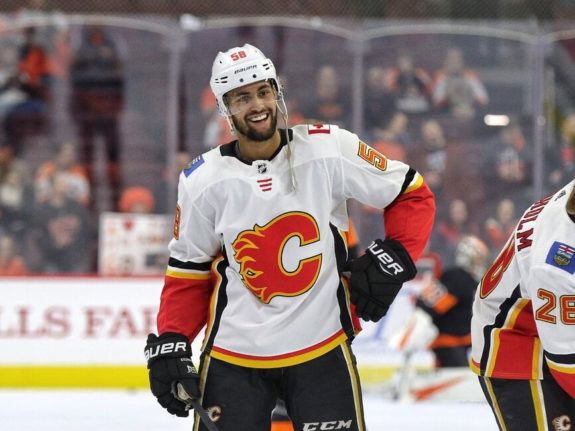
More recently, Johnny Gaudreau has been dragged into the “trade bait” conversation. However the Flames’ GM appears to have an appetite for making his team better in the short term, so it’s unlikely that Gaudreau moves mid-season.
What Assets Are Untouchable
When the news broke that Taylor Hall had been officially dealt to the Arizona Coyotes, analysts and NHL insiders started to come out with reports on how the deal went down, and which other teams were involved. Pierre Lebrun connected the Flames to Hall on two separate occasions, essentially implying that they were the runner up.
First, on TSN’s Insider Trading:
“A team came in and offered a package that was more of a hockey deal as opposed to a futures deal. Enough to the point where the Devils went back and forth with this mystery team, and went pretty far on it. […] It was serious enough in a conversation that a delay ended up happening with Arizona. I can’t tell you for sure who that mystery team is, but we have a strong suspicion that the Calgary Flames, who we know inquired on Taylor Hall, made a pretty strong offer.”
Next, in The Athletic, Lebrun stated that, “Calgary went a little harder than people realize” in their pursuit of a trade for the former MVP, (from “LeBrun: Why the Devils traded Taylor Hall when they did, plus the 7 other interested teams”, The Athletic, 17/12/2019).
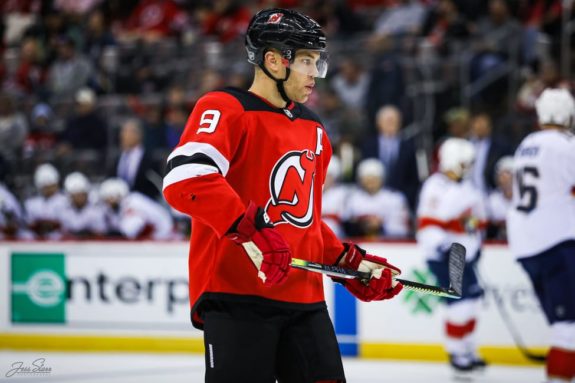
The big takeaway here is that Treliving reportedly tried to make more of a “hockey deal.” A consistent theme through all of Treliving’s trades and almost-trades is his apparent unwillingness to mortgage the future for the present. The Neal for Lucic trade was a textbook “hockey deal.”
According to credible sources:
- Treliving has stated on the record that he is happy with the current group.
- He was unwilling to part with Juuso Valimaki in order to get Mark Stone, (from “Juuso Valimaki motivated to show Flames were right to not trade him”, Calgary Sun, 01/03/2019).
- Treliving’s offer for Hall was centered around young players under team control, not prospects.
- The Flames are consistently ranked as one of the shallowest prospect pools league-wide. The team has not picked in the first round for two of the past five years, and in 2018 they did not pick until Round 4. It’s unlikely that Treliving will be keen to give up another first-round pick, hence the attempt at making a hockey deal rather than a futures deal for Hall.
By all accounts, it seems that Valimaki and Rasmus Andersson are almost untouchable. Andrew Mangiapane and Dillon Dube are probably non-starters as well. It’ll be extremely tough to pry those next two first-round draft picks away.
This Pat Steinberg tweet basically sums it up:
The best predictor of future behavior is past behavior. If valuable future assets like Valimaki and Andersson weren’t available then, they are not likely available now.
Brad Treliving Is Active, but Not Desperate
On the surface, Treliving’s flurry of activity since Feb. 2019 may appear frantic, like someone desperate to acquire any big-name forward that becomes available. If you dig a little deeper, which Friedman does better than almost anyone, you’ll find that’s not necessarily true.
Via the 31 Thoughts Podcast:
Brad Treliving’s got an extension. He’s comfortable. He just had a big year. It’s not a team that likes going backwards, but he is in a good spot. He likes to be in the middle of the action. […] Who are the GM’s that make the League go? The guys who are always talking, who are bringing people together, telling people what’s out there. They’re the information movers. Treliving is one of those guys. He’s calling a lot [to see] what’s out there. He likes to be in on everything.
The fact that he has inquired about several top-six players in the last 12 months does not mean that he is desperate to acquire anyone. He’s just talking and making offers, regardless of where his team sits in the standings. That’s who he is.
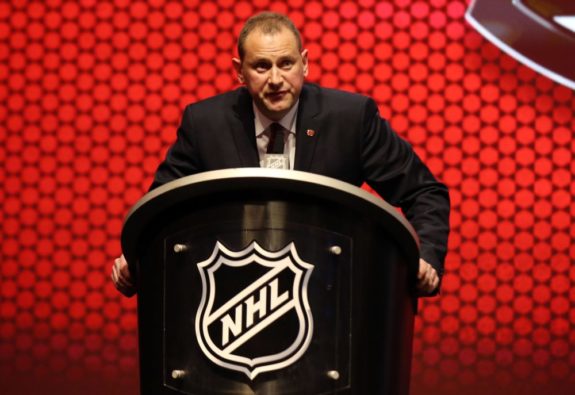
If the offers he deems reasonable don’t get accepted by the other side (as it happened with Stone and Hall), he seems more willing to go to war with the current group rather than overpay for stars.
Of course, the deliberate action he took to free up cap space does make things interesting. True to character, Treliving is reportedly not in the mood to sit on his hands after the Frolik trade, looking to act “soon” on his newfound cap space according to The Athletic’s Scott Cruickshank, (from “What does the Michael Frolik trade mean for the rest of Calgary’s season?”, The Athletic, 02/01/2020).
The Flames May Need a Little Luck on Their Side
Cautious as he may be, there are some things that are out of Treliving’s control. We saw two prime examples of misfortune in 2019, when he almost acquired Zucker at the deadline, and then almost acquired Kadri in the summer.
The Zucker deal, according to TSN’s Darren Dreger, did not happen because of a technicality that he called a “timing thing” and a “jam-up at the Central Registry.” There are no concrete details on what that actually means, but whatever it was, it doesn’t sound like either Treliving or former Wild GM Paul Fenton rejected the trade. It was bad timing. The Kadri deal was agreed upon by both Treliving and Dubas, but Kadri refused to waive his no-trade clause as a last-ditch effort to stay in Toronto. There wasn’t much the Flames’ GM could do there either.
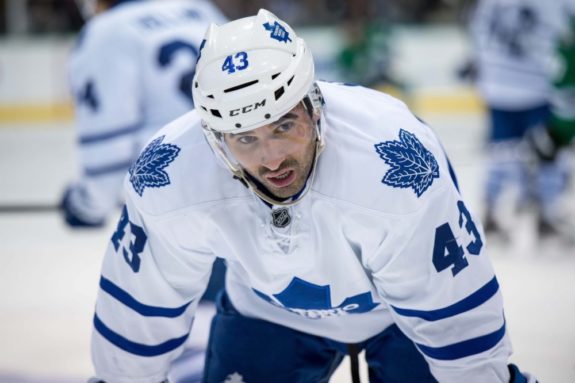
If Treliving is serious about acquiring a potential top-six forward, he may need to combine his shrewd dealmaking with a bowl of Lucky Charms each morning. What are the odds that three different Flames trades, agreed to by both GMs, will fall through in the same year? Hopefully slim.
Opportunity Knocks for Calgary
The Flames are in a tight race for a Pacific Division playoff spot with some cap space to weaponize. Some of the depth players that have been moved in and out of the lineup, placed on waivers, or involved in trade rumors will probably be more happy playing somewhere else. The stars seem aligned for a substantial trade in the next month or two.
The best predictor of future behavior is past behavior. Unfortunately, the Flames’ past behavior involved a very lackluster effort in the first round of the playoffs last season. The Flames can’t afford to repeat that behavior this time around and Brad Treliving knows it.